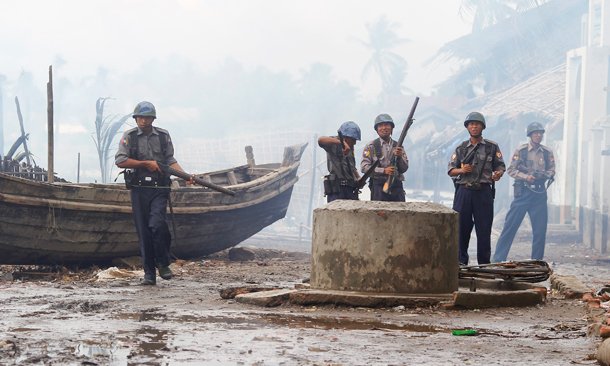RANGOON — Burma has publicly rejected calls by the US government for the involvement of international officials in an investigation into the alleged massacre of dozens of Rohingya Muslim villagers in Arakan State’s Maungdaw District.
On Tuesday, Minister of Foreign Affairs Wunna Maung Lwin and Ministry of Information officials briefed foreign diplomats, UN officials and news media about the incident in Du Chee Yar Tan village two weeks ago.
The officials repeated earlier government statements denying that any Rohingyas were killed in the village, and said that only a policeman had gone missing after being attacked by local Muslim villagers.
US Ambassador Derek Mitchell suggested during the briefing that the government set up an independent investigation commission that includes international officials to investigate the incident.
Burmese officials, however, said the government would continue with its plan to let the Myanmar Human Rights Commission (MHRC) and the Rakhine Investigation Commission investigate the events in southern Maungdaw Township. The latter commission already visited the village on Jan. 22 to 26, but said it found no evidence of the killing of any civilians.
Deputy Information Minister Ye Htut explained the discussion with the US Ambassador after the briefing.
“The diplomat said that they could not trust our government investigation. The diplomat asked us to let international investigators cooperate with our government for an investigation,” he told The Irrawaddy.
“Our government replied to the diplomat that this current issue is a domestic issue. We already have our own independent investigation commission; we don’t need an international investigation.”
“We will share all our information after our investigation is completed,” Ye Htut said, adding that European Union officials and other diplomats would be allowed to inspect Du Chee Yar Tan village soon.
The government has been angered by reports made by human rights groups and the UN High Commissioner for Human Rights Navi Pillay that suggest that at least 48 Rohingya villagers were killed by the police and an Arakanese Buddhist mob between Jan. 9-13. Most of the victims reportedly died in an apparent retaliation for the disappearance of a police officer.
Medical NGO Médecins Sans Frontières (MSF), which works in northern Arakan State, said on Friday that it had treated 22 Rohingyas who were injured during the incident.
The government has also lashed out at media organizations for their coverage of the alleged massacre and state-run newspapers singled out the Associated Press and The Irrawaddy for criticism. On Tuesday, reporters of The Irrawaddy, Associated Press, Voice of America, The Myanmar Times, Mizzima and other media were denied access to the briefing.
Ye Htut criticized the UN reports of the alleged killings and news organizations that had written about the incident.
“The UN and international news organizations reported about the death of people in the village from [sources in] the village. They should bring evidence to us for investigation,” he said. “We will take action against anyone who violated the law. We did not protect only one side. We protect two sides in order to have peace in the community.”
On Friday, the Foreign Affairs Ministry warned that any international aid organization or media group that releases information that is not verified by government officials would be considered as “interfering in internal affairs.”
The Associated Press’ Senior Managing Editor for International News John Daniszweki said on Monday that the agency had been surprised by the government’s reaction “because we felt that our reporting was accurate and hewed closely to the facts.”
Daniszweki said the agency hoped to continue discussions with the government about its reporting in Burma, but added that it would be impossible to comply with the ministry’s directive. “If we only reported information verified by governments, there would be no reason for an independent press,” he wrote in an email.
Inter-communal violence between Arakanese Buddhists and stateless Rohingya Muslims has broken out sporadically in Arakan State since mid-2012, leading to scores dead and at least 140,000 displaced, mostly Muslims.
International human rights have accused the central government and regional authorities of offering tacit support for the Arakanese Buddhists during the conflict, while security forces deployed in the region have been accused of committing widespread rights abuses against the Rohingya minority.















